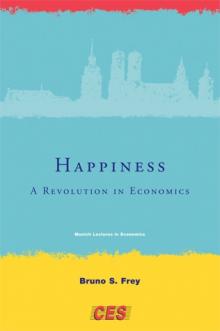HappinessA Revolution in Economics
|

|
 Zusammenfassungen
Zusammenfassungen
 Revolutionary developments in economics are rare. The conservative bias of the field and its enshrined knowledge make it difficult to introduce new ideas not in line with received theory. Happiness research, however, has the potential to change economics substantially in the future. Its findings, which are gradually being taken into account in standard economics, can be considered revolutionary in three respects: the measurement of experienced utility using psychologists’ tools for measuring subjective well-being; new insights into how human beings value goods and services and social conditions that include consideration of such non-material values as autonomy and social relations; and policy consequences of these new insights that suggest different ways for government to affect individual well-being. In Happiness, emphasizing empirical evidence rather than theoretical conjectures, Bruno Frey substantiates these three revolutionary claims for happiness research. After tracing the major developments of happiness research in economics and demonstrating that we have gained important new insights into how income, unemployment, inflation, and income demonstration affect well-being, Frey examines such wide-ranging topics as democracy and federalism, self-employment and volunteer work, marriage, terrorism, and watching television from the new perspective of happiness research. Turning to policy implications, Frey describes how government can provide the conditions for people to achieve well-being, arguing that a crucial role is played by adequate political institutions and decentralized decision making. Happiness demonstrates the achievements of the economic happiness revolution and points the way to future research.
Revolutionary developments in economics are rare. The conservative bias of the field and its enshrined knowledge make it difficult to introduce new ideas not in line with received theory. Happiness research, however, has the potential to change economics substantially in the future. Its findings, which are gradually being taken into account in standard economics, can be considered revolutionary in three respects: the measurement of experienced utility using psychologists’ tools for measuring subjective well-being; new insights into how human beings value goods and services and social conditions that include consideration of such non-material values as autonomy and social relations; and policy consequences of these new insights that suggest different ways for government to affect individual well-being. In Happiness, emphasizing empirical evidence rather than theoretical conjectures, Bruno Frey substantiates these three revolutionary claims for happiness research. After tracing the major developments of happiness research in economics and demonstrating that we have gained important new insights into how income, unemployment, inflation, and income demonstration affect well-being, Frey examines such wide-ranging topics as democracy and federalism, self-employment and volunteer work, marriage, terrorism, and watching television from the new perspective of happiness research. Turning to policy implications, Frey describes how government can provide the conditions for people to achieve well-being, arguing that a crucial role is played by adequate political institutions and decentralized decision making. Happiness demonstrates the achievements of the economic happiness revolution and points the way to future research. Dieses Buch erwähnt ...
Dieses Buch erwähnt ...
 Begriffe KB IB clear | Arbeitwork
,  Arbeitslosigkeit Arbeitslosigkeit unemployment
, Autonomieautonomy
, unemployment
, Autonomieautonomy
,  Demokratie Demokratie democracy
, democracy
,  Terrorismus Terrorismus terrorism
, terrorism
,  Zufriedenheit / Glück Zufriedenheit / Glück happyness
, happyness
,  Zukunft Zukunft future future
|
 Tagcloud
Tagcloud
 Zitationsgraph
Zitationsgraph
 Zitationsgraph (Beta-Test mit vis.js)
Zitationsgraph (Beta-Test mit vis.js)
 Zeitleiste
Zeitleiste
 10 Erwähnungen
10 Erwähnungen 
- Robots Will Steal Your Job, But That's OK - how to survive the economic collapse and be happy (Frederico Pistono) (2012)

- The Impulse Society - America in the Age of Instant Gratification (Paul Roberts) (2014)

- The Zero Marginal Cost Society - The Internet of Things, the Collaborative Commons, and the Eclipse of Capitalism (Jeremy Rifkin) (2014)

- Resonanz - Eine Soziologie der Weltbeziehung (Hartmut Rosa) (2016)

- Wenn die Roboter kommen - Den Arbeitsmarkt für die Digitalisierung vorbereiten (Tibère Adler, Marco Salvi, avenir suisse) (2017)


- The Coddling of the American Mind (Greg Lukianoff, Jonathan Haidt) (2018)

- The Technology Trap - Capital, Labor, and Power in the Age of Automation (Carl Benedikt Frey) (2019)

- A World Without Email (Cal Newport) (2021)

- Noise (Daniel Kahneman, Olivier Sibony, Cass R. Sunstein) (2021)

- Lernen im Zeitalter der Digitalisierung - Einblicke und Handlungsempfehlungen für die neue Arbeitswelt (Mark Harwardt, Peter F.-J. Niermann, Andre M. Schmutte, Axel Steuernagel) (2023)


- Mensch versus Maschine? Kein Vergleich. - Möglichkeiten der KI im Verhältnis zu ihren Erfindern (Bernd Lorscheider)


- Mensch versus Maschine? Kein Vergleich. - Möglichkeiten der KI im Verhältnis zu ihren Erfindern (Bernd Lorscheider)
 Co-zitierte Bücher
Co-zitierte Bücher

Wirtschaft und Gesellschaft
(Max Weber) (1964)
Bowling alone
(Robert Putnam) (2000)

Das Kapital
(Karl Marx)

How the Digital Revolution is Accelerating Innovation, Driving Productivity, and Irreversibly Transforming Employment and the Economy
(Erik Brynjolfsson, Andrew McAfee) (2011)

Skills, Tasks and Technologies
Implications for Employment and Earnings
(Daron Acemoglu, David Autor) (2010)

 Bibliographisches
Bibliographisches 
 Beat und dieses Buch
Beat und dieses Buch
Beat hat dieses Buch während seiner Zeit am Institut für Medien und Schule (IMS) ins Biblionetz aufgenommen. Beat besitzt weder ein physisches noch ein digitales Exemplar. Aufgrund der wenigen Einträge im Biblionetz scheint er es nicht wirklich gelesen zu haben.












 Biblionetz-History
Biblionetz-History